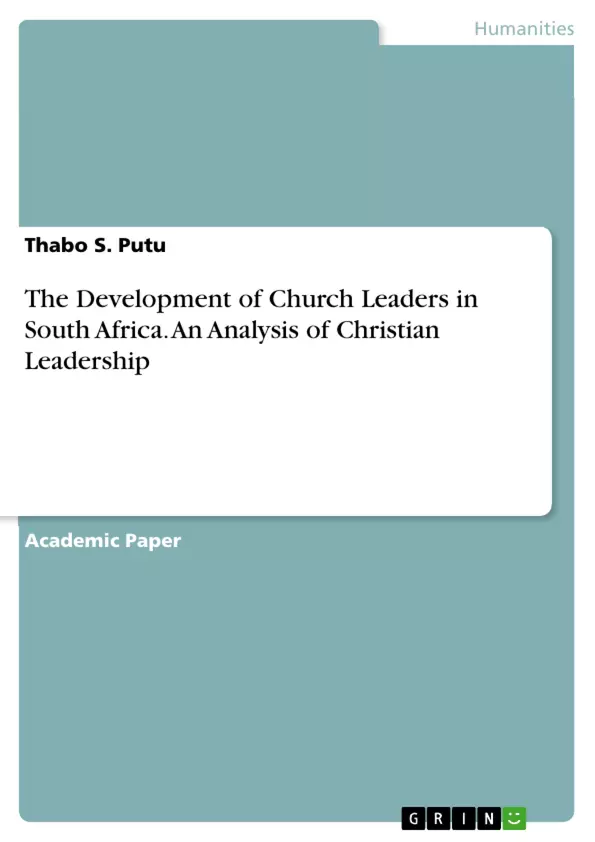In this analysis, the development of church leaders in South Africa is examined, with a particular focus on the dynamics of Christian leadership. The aim is to develop an in-depth understanding of the various facets of church leadership, from the definition and meaning of leadership to the specific challenges and strategies that are relevant in this context. Beginning with an introduction to the concept of leadership, the text explores the call to leadership, the personality traits of effective leaders and the importance of charismatic leadership. A key focus is on leadership development, examining different roles such as servant, shepherd, steward and overseer. Particular attention is given to the development of other leaders and the importance of vision bearers, emphasising the role of leadership in the context of church growth and shared leadership. The conclusion rounds off the analysis and provides a comprehensive overview of the key aspects of church leadership in South Africa.
Inhaltsverzeichnis (Table of Contents)
- Introduction
- Leadership defined
- The Call for Leadership
- The Personality of the leader
- Charismatic Leadership
- Training of Leaders
- The work of leaders
- Leader a Servant
- Leader as Shepherd
- Leader as a Steward
- Leader as an Overseer
- Developing other Leaders
- Leader as a vision holder
- Developing others
- Leaders and Church Growth
- Shared Leadership
- Conclusion
Zielsetzung und Themenschwerpunkte (Objectives and Key Themes)
This text aims to examine the role of church leadership in South Africa, exploring the challenges and opportunities facing leaders in a dynamic and changing context. It highlights the need for effective and visionary leadership within the church, emphasizing the importance of training and development in this field. The text also explores the relationship between church leadership and church growth.
- The Importance of Effective Leadership in the Church
- Challenges Faced by Church Leaders in South Africa
- The Need for Training and Development of Church Leaders
- The Relationship between Church Leadership and Church Growth
- The Impact of Changing Social and Political Norms on Church Leadership
Zusammenfassung der Kapitel (Chapter Summaries)
The introduction lays out the context for the text, emphasizing the need for strong and effective leadership in South Africa, particularly within the church. The text then explores the definition of leadership, the call for leadership, and the personality traits of a leader. It also examines different leadership styles, including charismatic leadership, and discusses the importance of training and developing leaders.
The text further examines the various roles of church leaders, including serving as servants, shepherds, stewards, and overseers. It also discusses the importance of developing other leaders and the role of vision holders in leading church growth. The text concludes by exploring the concept of shared leadership and its potential for promoting healthy church growth.
Schlüsselwörter (Keywords)
The key focus of this text is on church leadership in South Africa. It examines the challenges faced by leaders, emphasizing the need for effective, skilled, and visionary leadership. The text also explores the role of training and development in building strong and capable church leaders. Key themes include leadership styles, training programs, and the relationship between church leadership and church growth.
Frequently Asked Questions
What are the primary roles of a church leader discussed in this analysis?
The analysis explores roles such as servant, shepherd, steward, and overseer within the context of Christian leadership.
Why is leadership training particularly important in South Africa?
It is essential for addressing the dynamic social and political changes and for promoting healthy church growth through skilled leadership.
What is the relationship between leadership and church growth?
The text emphasizes that visionary leadership and the development of other leaders are key drivers for sustainable church growth.
What defines "Charismatic Leadership" in this context?
It refers to the personality traits and the "call" that enable a leader to inspire and guide a congregation effectively.
What is the concept of "Shared Leadership"?
Shared leadership involves distributing responsibilities and vision among multiple leaders to foster a more collaborative and resilient church environment.
- Citar trabajo
- Thabo S. Putu (Autor), 2020, The Development of Church Leaders in South Africa. An Analysis of Christian Leadership, Múnich, GRIN Verlag, https://www.grin.com/document/924289



